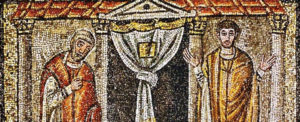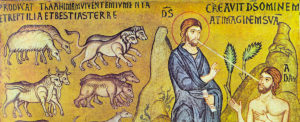Here in the United States, followers of the recent movement called Dispensationalism tend to refer to the classic Christian teaching about israel as “replacement theology.” That’s unfortunate, because it altogether misrepresents what Christians have historically taught about Israel and the Church.
All over the Torah we find references to the Qahal YHWH, usually translated as the assembly or congregation of the Lord (e.g. Numbers 14:5). The Qahal YHWH was not the entire race of the Hebrews; only the ones who were admitted to the worshiping community centered on the tabernacle of YHWH. Not everyone in Israel was admitted to this assembly.
In the third century BC, the Jewish translators of the Septuagint usually translated qahal with the Greek word ekklesia, which meant about the same thing. (The Hebrew book entitled Qoheleth, “the Preacher,” is still known to us by its Greek name “Ecclesiastes.”)
Background: Greeks used ekklesia to refer to a group with authority and a unifying purpose, for instance a chartered governing assembly (Liddell and Scott: the “assembly duly summoned”). The ancient Greek historian Xenophon describes a group called upon to render a decision about the requests of ambassadors during wartime, calling them ekkletos (called out). The assembly of pagans in Ephesus is called an ekklesia in Acts 19:32. An ekklesia was summoned when official decisions or judgments had to be made. Presiding over an ekklesia was an overseer, or episkopos.
Again, in scripture the ekklesia was never the entire race of Israel, it was the ones who were faithful to YHWH. In some periods this remnant was vanishingly small: At times there were even pagan idols at the gate and within the temple, and Elijah believed for a time that he was the only worshiper of YHWH left in Israel.
When Israel’s God finally appeared in the flesh, thousands of the faithful acknowledged Him as Lord. Those who believed in their God when He appeared were still the qahal, the ekklesia, as they always had been. To their number were quickly added many Gentile converts, until within a generation the Jewish membership in the ekklesia became a minority.
At the same time, when the God of Israel appeared in the flesh, there were descendants of Israel who did not receive Him. Paul writes that their unbelief separates them from the Source of life, just as the faithfulness of believers unites them to Him. In this he echoes Christ’s teaching on the believer’s union with God through faith, and the cutting-off of the unfaithful. By unbelief, those who disbelieved in their God when He appeared, placed themselves outside the promises made to Abraham for his believing offspring: the ekklesia.
At no time did the Ekklesia “replace” Israel. The promises made to Abraham were always for his believing descendants. As the greatest of the prophets said, “Do not think to say to yourselves, ‘We have Abraham as our father.’ For I say to you that God is able to raise up children to Abraham from these stones.”
The ekklesia has always been the believing remnant, the ones faithful to the God of Abraham, Isaac and Jacob, both those born into Abraham’s family and converts from among the gentiles.
It’s unfortunate that in English we have a new and different word, “church,” to translate ekklesia or qahal — this makes the unity between the Old Testament church and the New Testament church much less obvious than in the Greek.






